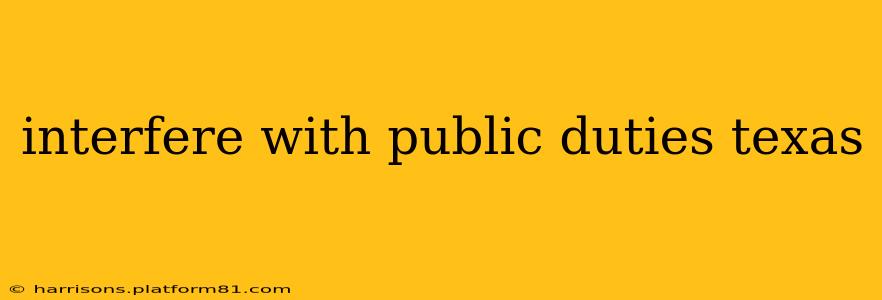Interfering with a public servant's duties is a serious offense in Texas, carrying significant legal consequences. This guide explores the intricacies of this crime, clarifying what constitutes interference, the types of offenses involved, and the potential penalties. Understanding these aspects is crucial for both citizens and public servants alike.
What Constitutes Interference with Public Duties in Texas?
Texas Penal Code § 38.15 defines interference with public duties as intentionally or knowingly preventing or obstructing a person in the performance of their duties as a public servant. This is a broad definition, encompassing a range of actions. The key elements are:
- Intent: You must have acted intentionally or knowingly. This means you understood your actions would hinder a public servant. Accidental interference generally isn't a crime.
- Prevention or Obstruction: Your actions must have actively prevented or obstructed the public servant from doing their job. This isn't limited to physical interference; it includes verbal harassment, threats, or other disruptive behaviors.
- Public Servant: This refers to anyone authorized by law to perform a governmental function. This includes police officers, firefighters, judges, and even school teachers or park rangers, among others.
Types of Interference with Public Duties
Several actions can constitute interference with public duties, ranging from minor infractions to more serious felonies. The severity of the charge depends on the specific actions and the context.
Resisting Arrest
Resisting arrest is a common form of interference. This involves actively opposing a lawful arrest by a law enforcement officer. Simply refusing to comply might be enough, while actively fighting back significantly increases the severity of the charges.
Obstructing a Highway or Other Public Place
This offense involves unlawfully obstructing a public thoroughfare, impeding the movement of people and emergency services. This could involve staging a protest that blocks traffic or leaving a large object in the roadway.
Assaulting or Threatening a Public Servant
Assaulting or threatening a public servant is a far more serious offense. This includes physical attacks, verbal threats of violence, or actions that cause a reasonable apprehension of immediate bodily harm. The penalties for these crimes are significantly higher.
Penalties for Interfering with Public Duties in Texas
The penalties for interfering with public duties in Texas vary greatly depending on the specific offense and the circumstances. Factors considered include the nature of the interference, the intent of the offender, and any injuries or damages caused.
Penalties can range from:
- Class C Misdemeanor: This is the least serious offense, punishable by a fine up to $500.
- Class B Misdemeanor: Punishable by a fine up to $2,000 and/or up to 180 days in jail.
- Class A Misdemeanor: Punishable by a fine up to $4,000 and/or up to one year in jail.
- Felonies: More serious offenses, such as assaulting a public servant, can result in significant prison time and substantial fines.
What if I'm Accused of Interfering with Public Duties?
If accused of interfering with public duties in Texas, it is crucial to seek legal counsel immediately. An experienced attorney can advise you on your rights, help you understand the charges against you, and build a strong defense. The consequences of a conviction can be severe, affecting your employment, reputation, and future opportunities.
H2: What are the defenses against charges of interfering with public duties?
Defenses vary depending on the specifics of the case. A successful defense might hinge on demonstrating that:
- The arrest or detention was unlawful: If the public servant acted illegally, interfering with their actions might not constitute a crime.
- The actions did not constitute intentional obstruction: Showing that the interference was accidental or unintentional is a key element in avoiding conviction.
- Self-defense or defense of others: If the actions were taken to protect oneself or another from harm, a valid self-defense claim could be made.
H2: Can I be charged with interfering with public duties for filming police officers?
Filming police officers in public is generally protected under the First Amendment. However, actively interfering with their duties during an arrest or investigation could still lead to charges. The key is to ensure that filming is done passively and doesn't obstruct the officers' ability to perform their duties.
H2: What are the different levels of interference with public duties?
The levels of interference are reflected in the different classes of misdemeanor and felony charges, as outlined above. The severity of the charge depends on the actor's intent, the nature of the interference, and the resulting harm or disruption caused.
This information is for educational purposes only and should not be considered legal advice. Always consult with a qualified Texas attorney for advice on any legal matter.
